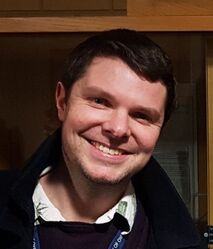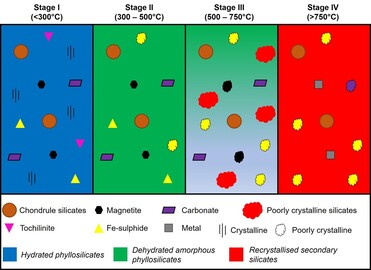About

The solar system formed from the collapse of an interstellar cloud of gas and dust ~4.6 billion years ago. But how did that gas and dust coalesce into the Sun and planets that we see today? And what processes and events led to the formation of habitable planets like the Earth? Meteorites are rocky time capsules that can be used to probe the earliest stages of solar system formation and the evolution of planets.
I'm a planetary scientist and UKRI Future Leaders Fellow at the Natural History Museum, London. I explore the origin of solar systems by studying the physical and chemical properties of meteorites and extraterrestrial materials returned to Earth by space missions. I have expertise in a wide range of analytical techniques including electron microscopy, mass spectrometry, and laboratory and synchrotron-based spectroscopy. I use these tools to investigate presolar and solar dust in the protoplanetary disk, the geological history of primitive planetesimals, and the relationship between meteorites, asteroids and comets.
I'm a planetary scientist and UKRI Future Leaders Fellow at the Natural History Museum, London. I explore the origin of solar systems by studying the physical and chemical properties of meteorites and extraterrestrial materials returned to Earth by space missions. I have expertise in a wide range of analytical techniques including electron microscopy, mass spectrometry, and laboratory and synchrotron-based spectroscopy. I use these tools to investigate presolar and solar dust in the protoplanetary disk, the geological history of primitive planetesimals, and the relationship between meteorites, asteroids and comets.
News

19th February 2021
New paper out charactersing the mineralogy and water contents of thermally metamorphosed CM chondrites. Using a combination of X-ray diffraction (XRD), infrared (IR) spectroscopy and thermogravimetric analysis (TGA) we track how progressive heating dehydrated phyllosilicates and led to the recrystallisation of olivine, pyroxene and metal. From this we can start to reconstruct the aqueous and thermal history of water-rich asteroids, such as Ryugu and Bennu, in the early solar system.
King A. J. et al. (2021) Thermal alteration of CM carbonaceous chondrites: Mineralogical changes and metamorphic temperatures, Geochimica et Cosmochimica Acta 298:167.
7th February 2021
New paper out from the Planetary Materials Group at the Natural History Museum reviewing the aqueous alteration of CM chondrites. This review is timely as we start preparing for the analysis of samples returned from asteroid Ryugu and Bennu by the Hayasbusa2 and OSIRIS-REx missions.
Suttle M. D. et al. (2021) The aqueous alteration of CM chondrites, a review, Geochimica et Cosmochimica Acta doi.org/10.1016/j.gca.2021.01.014.
In other news, the program for this year's virtual Lunar & Planetary Science Conference is now available. We're involved in several projects investigating carbonaceous and enstatite chondrites that will be presented during the meeting:-
King et al. (#1909) Bulk mineralogy and water contents of the carbonaceous chondrite falls Kolang and Tarda
Zenie et al. (#1434) Relict forsterite in unequilibrated enstatite chondrites
Bonato et al. (#2364) Spectroscopic characterisation of primitive CO3 carbonaceous chondrites
Sridhar et al. (#1095) Constraints on the ice composition of carbonaceous chondrites
Schrader et al. (#1058) The Fe/S ratio of pyrrhotite group sulfides in chondrites is related to the degree of oxidation
21st November 2020
We're hosting a Royal Astronomical Society Specialist Discussion Meeting!
Analysis of Extraterrestrial Materials: Current Capabilities & Future Opportunities
Our aim is to bring together the international sample analysis community to discuss the current and future analytical and curation capabilities that will maximise the scientific impact of extraterrestrial sample return missions.
Virtual Meeting held on the 11th December 2020 (schedule available below)
Please send enquiries to a.king at nhm.ac.uk
Organised by: Ashley King (NHM), Natasha Almeida (NHM), Luke Daly (University of Glasgow), Leon Hicks (University of Leicester), Natasha Stephen (University of Plymouth), Romain Tartese (University of Manchester) & Penny Wozniakiewicz (University of Kent).
New paper out charactersing the mineralogy and water contents of thermally metamorphosed CM chondrites. Using a combination of X-ray diffraction (XRD), infrared (IR) spectroscopy and thermogravimetric analysis (TGA) we track how progressive heating dehydrated phyllosilicates and led to the recrystallisation of olivine, pyroxene and metal. From this we can start to reconstruct the aqueous and thermal history of water-rich asteroids, such as Ryugu and Bennu, in the early solar system.
King A. J. et al. (2021) Thermal alteration of CM carbonaceous chondrites: Mineralogical changes and metamorphic temperatures, Geochimica et Cosmochimica Acta 298:167.
7th February 2021
New paper out from the Planetary Materials Group at the Natural History Museum reviewing the aqueous alteration of CM chondrites. This review is timely as we start preparing for the analysis of samples returned from asteroid Ryugu and Bennu by the Hayasbusa2 and OSIRIS-REx missions.
Suttle M. D. et al. (2021) The aqueous alteration of CM chondrites, a review, Geochimica et Cosmochimica Acta doi.org/10.1016/j.gca.2021.01.014.
In other news, the program for this year's virtual Lunar & Planetary Science Conference is now available. We're involved in several projects investigating carbonaceous and enstatite chondrites that will be presented during the meeting:-
King et al. (#1909) Bulk mineralogy and water contents of the carbonaceous chondrite falls Kolang and Tarda
Zenie et al. (#1434) Relict forsterite in unequilibrated enstatite chondrites
Bonato et al. (#2364) Spectroscopic characterisation of primitive CO3 carbonaceous chondrites
Sridhar et al. (#1095) Constraints on the ice composition of carbonaceous chondrites
Schrader et al. (#1058) The Fe/S ratio of pyrrhotite group sulfides in chondrites is related to the degree of oxidation
21st November 2020
We're hosting a Royal Astronomical Society Specialist Discussion Meeting!
Analysis of Extraterrestrial Materials: Current Capabilities & Future Opportunities
Our aim is to bring together the international sample analysis community to discuss the current and future analytical and curation capabilities that will maximise the scientific impact of extraterrestrial sample return missions.
Virtual Meeting held on the 11th December 2020 (schedule available below)
Please send enquiries to a.king at nhm.ac.uk
Organised by: Ashley King (NHM), Natasha Almeida (NHM), Luke Daly (University of Glasgow), Leon Hicks (University of Leicester), Natasha Stephen (University of Plymouth), Romain Tartese (University of Manchester) & Penny Wozniakiewicz (University of Kent).
| ras_et_materials_schedule_dec2020.pdf | |
| File Size: | 165 kb |
| File Type: | |
